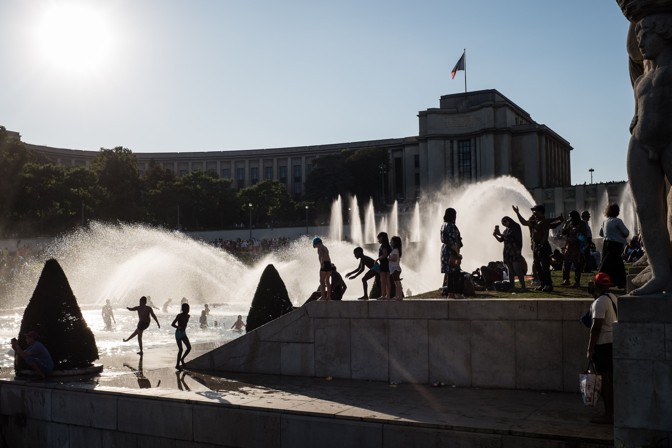August in Paris is over, and I miss it already. The deadest month, the most quiet, the month when Parisians leave on their endless holidays and the city empties out like a resort in the off season, only less melancholy. Traffic thins; shops close, sometimes for the entire month; restaurants shut; there are seats to be found on the metro; and in the evening, stragglers (not everyone can afford to go away) emerge from their stuffy, un-air-conditioned apartments and gather along the banks of the Seine.
In August, this uptight city unbuttons a few more buttons.
One warm evening, I walked a good stretch of riverfront promenade, and the scene was joyous. Families out for a walk; kids climbing on climbing walls; couples embracing; friends at picnic tables eating from Tupperware; tourists taking pictures of wounded Notre-Dame, without her spire, encased in scaffolding; South Asian men selling bottles of beer and chilled rosé from backpacks—“Du vin, madame?”—people of all ages and colors dancing with abandon to Michael Jackson’s Thriller on a makeshift dance floor near the Pont Neuf, like wild teenagers letting it loose while their parents are out of town.
The bakery near my apartment was closed for the first three weeks of August. Three weeks! For a while, when I looked out my apartment windows in the evenings, nary a light was on in the building across the street. Even Google knows it is August in Paris. Gmail recently offered some canned responses to an invitation I’d received. Its options: “I’ll be there!” “I’ll come!” and “I’m on vacation!” I managed to get a table, without waiting, at one of the best restaurants in Paris.
The French government shuts down in August, too. It is not uncommon for high-level officials with sensitive dossiers in important ministries to take three or four weeks off, without checking email. The entire country operates on what’s basically an academic schedule. In May and June, people start making appointments for after the rentrée—that is, September. Employees have seven weeks of paid holiday time (albeit with lower pay than their counterparts elsewhere).

And then there is the news in August. This summer, France Inter, the country’s equivalent of National Public Radio, ran a daily five-minute series just before 8 a.m. The topic was “A Summer With Pascal,” on the life and work of Blaise Pascal—his views on God, the body, justice, free will, his method, his writing style, his reception during the Enlightenment. Vive la France. One of the most famous radio and TV hosts here, Léa Salamé, ran a summer series on France Inter called “Powerful Women,” for which she interviewed some of the most powerful women in France—writers, politicians, a rabbi. That powerful women are seen as material for a series that airs only during the summer, when listenership is down, may say something about the state of feminism in France today.
Newsrooms empty out, and so newspapers prepare long summer serials in installments. These are often the most engrossing pieces in all of French journalism. Le Monde’s series included “On the Planet of the Ultra-Rich,” (in New York, Silicon Valley, private schools), as well as one on the decline of the French Socialist Party. This began with “François Hollande: The Original Sin,” about the former French president, and went through the rise of President Emmanuel Macron, who split from the Socialists to form his own party. Le Monde also ran series on DNA evidence and six interviews with feminists (Emma Thompson; the Egyptian author and activist Mona Eltahawy; Inna Shevchenko, a co-founder of the Ukrainian collective Femen.) Good profiles, but again part of the women-as-special-section-in-August phenomenon.
This summer, the conservative daily Le Figaro’s series included “Intellectuals Forced Into Exile” and—this is classic Figaro—“Descendants,” which began with Laura Keynes, whom it described as “great-granddaughter of Darwin and a practicing Catholic.” A few years ago, Le Figaro, the preferred newspaper of France’s conservative upper-class, had an 11-part series following in the footsteps of Napoleon, and another in the footsteps of George Orwell, from Catalonia to Wigan Pier to Burma.
One drowsy August evening, I turned on French TV to find an in-depth candid-camera investigation into the many and various ways a person can get ripped off in Paris—cabs at the airport who scammed unsuspecting Canadians; a gang of girls who stole a tourist’s cellphone by the Seine; a restaurant that claimed its food was homemade when it wasn’t. “C’est quoi, ça?” (“What exactly is this?”) the reporter leading the investigation asked, with disdain that bordered on horror, as the hidden camera showed her lifting a leaden lump of pale melted cheese out of what was supposed to be homemade French onion soup.
Of all the cities I’ve lived in, August is best in Paris. August barely registers in New York, where it seems to be a point of pride never to take time off. August in Rome is funereal and oppressively hot, tolerable only if you’re falling in love. But Paris is alive enough to be energizing—museums and movie theaters are open, there are outdoor concerts, it’s not entirely shut down—and it’s quiet enough to concentrate.
I will miss all this: the calm, the summer series, the lost tourists who ask me for directions. The rentrée is in full swing. The regular hosts are back on morning radio talking about Macron’s legislative agenda. School starts again soon. In the evenings, there are lights on in the building across the street, and neighbors visible through the open windows—a couple smoking on their balcony while their tween daughter vogues in front of her mirror one room over. The traffic is back. The honking of horns. On the street, women have deep suntans and some men haven’t yet traded their striped espadrilles for lace-ups. At least for a few more days.

No comments:
Post a Comment